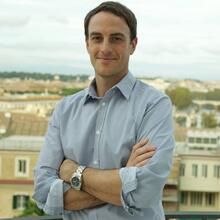A Reflection for Saturday of the Third Week of Advent
You can find today’s readings here.
Thus the total number of generations from Abraham to David is fourteen generations; from David to the Babylonian exile, fourteen generations; from the Babylonian exile to the Christ, fourteen generations. (Mt 1:17)
The imagery of the Christmas story that we celebrate each year comes from two of the four Gospels: Luke and Matthew. Luke’s infancy narrative is known for positioning Mary as the protagonist, the woman on whom everything depends. Matthew centers Joseph, whose righteousness shines forth in his choice to practice mercy instead of enforcing rules and regulations, as moral ambiguity hovers over Mary’s pregnancy. Luke tells the story of the shepherds. Matthew tells the story of the Magi. Reading them side by side, these two definitive accounts of Jesus’ birth are quite different.
One of the interesting commonalities is that both Luke and Matthew include a genealogy, an ancestral line traced back through Jewish history. Yet even here, they differ. Matthew goes back to Abraham, the great patriarch. Luke goes back further, to Adam, the first man. Different ancestors are sprinkled throughout.
As Christians, we put great emphasis on Jesus’ sonship to God, the Father. If you knew nothing else about Christianity in 2022, you’d probably know that Christians believe Jesus is the son of God. So why did Luke and Matthew take such care in tracing Jesus’ human lineage?
There are important historical, literary, pastoral and theological reasons, certainly. Not least of which is that God is present and operative in human history. To presume that Jesus’ relationship to God Almighty necessarily distances him from our earthly reality, including his own ancestral family, is to miss the whole point of the story.
For me, reading the genealogies of Jesus is always heartwarming and encouraging. I’m glad that the church chooses to incorporate them into its liturgical calendar. Reading through the names, no doubt butchering the pronunciation of many, reminds me that no one sets out on this journey alone. We all came from somewhere. We carry the stories that made us, into the world, into society, into our church.
And while everyone’s story is different, we are all connected. The Christian tradition, in its wisdom, presents us with two infancy narratives, two genealogies. They are different, just like we are different. And yet they are connected, just like we are connected.
Get to know Sebastian Gomes, Executive Editor of Audio and Video
Favorite Advent or Christmas themed art? Lo, How a Rose E'er Blooming
Favorite Christmas tradition? On Christmas morning, the first thing my dad does is blare the Hallelujah chorus from Handel’s “Messiah”. I’m fairly sure it’s an Easter song, but not in the Gomes household!
Which project are you most proud to have worked on this year at America? Our biggest video production ever at America was released this fall, “People of God: How Catholic Parish Life is Changing in the United States.” I’m very proud of it as a film but even more as a tool for Catholics in the U.S. to start a conversation about the realities we face as a believing community moving into the future.
Favorite Christmas recipe? I used to hate it, now I love it: fruitcake! If it’s made by Trappist monks, all the better!
Favorite Christmas photo? My cat Aeris with presents!









